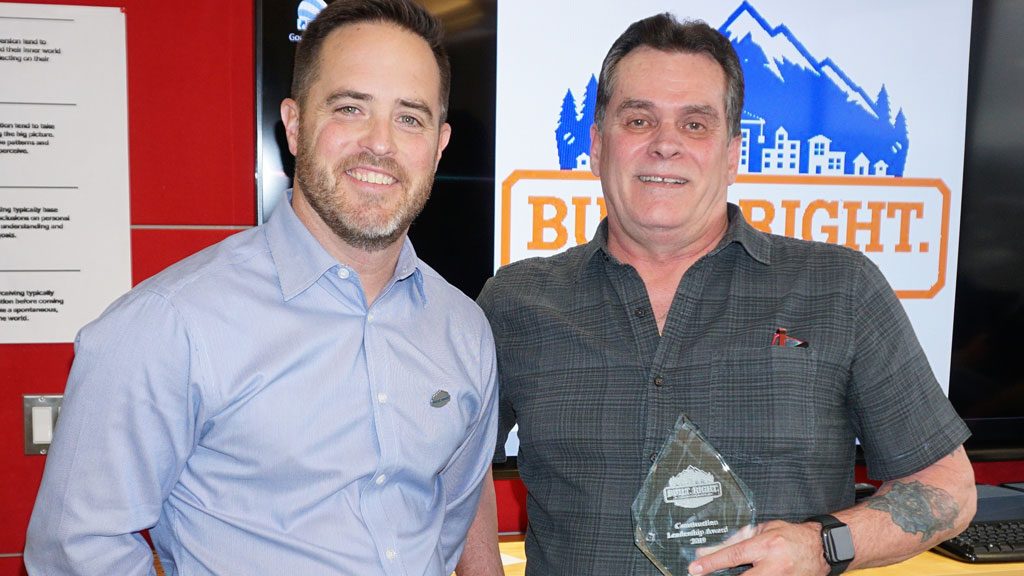Mike Haley was a model employee. He loved his job as manager of program services at Scott Construction Group in Burnaby, B.C. He rarely missed a workday and got along well with his co-workers.
Inside though, he harboured a dark secret. Something was wrong. After work, he didn’t socialize. Instead, he went home, kept to himself and suffered in silence.
Haley, who’d been in the construction industry most of his adult life, lived with depression, a complex mood disorder that, according to Statistics Canada and other organizations, affects 4.7 per of the population.
“It was just not being happy,” the 61-year-old father of five recalls. “At work and stuff, I loved my job and they figured I was a sociable and fun-loving guy, but inside I was not.”
He hid it well.
“With my job, I have to be with people all the time, so I’d mask it during the day and just shut down at night.”
He was used to working that way. He’d always had dark thoughts but didn’t seek help because of the stigma associated with mental illness.
“I figured it was just part of life. My dad was a firm believer in, ‘Suck it up, be a man,’ and so that’s what I did for years.”
The depression took its toll, though, he says, and contributed to the destruction of his two marriages.
Once you know the mental-health statistics for our industry, you can’t remain inactive
— Donna Grant
Scott Construction Group
“You just shut down and don’t want to socialize and you make excuses, not going out to parties and all that kind of stuff.”
A few years back, though, as a member of Scott’s joint occupational safety and health (JOSH) committee, Haley heard that a member’s wife was dealing with depression. After a meeting, he asked company president Darin Hughes, who was vice-president at the time, if a mental health committee could be started.
“He said, ‘Yeah, let’s run with it.’ So, we started the mental health committee,” says Haley. “It was kind of a hidden agenda for me because I was down in the dumps.”
At the meetings, he listened and, afterwards, did more research. Strangely, he was helping to further the discussion about mental health while having problems of his own.
While attending a mental-health first-aid course, he learned there was a 1-800 number to call for help.
“I thought, ‘You know what, I’m not the only one who’s going through it, and there’s help out there.’ But I still went home every night and stared at my phone and thought, ‘Am I going to call that number?’”
Finally, after three or four weeks of thinking about it, he summoned the courage.
“I was having thoughts of taking the wheel and going in front of a transport truck or something,” he recalls. He figured it was the best way to go.
But that was also the turning point for Haley. He dialed the hotline number.
“They were very, very helpful and understanding and asked the question, ‘Are you thinking of hurting yourself?’”
Haley sought help. He saw a counsellor who started him on his journey to recovery. He also started taking St. John’s Wort, a flowering plant which is a strong antidepressant. But he started having depressive thoughts again so went to his doctor and got referred to another counsellor who listened and recommended a self-help book. After just three visits with the counsellor, he was really on his way to healing.
He started exercising and looking after his mental health. He began taking Fridays off in the summer to go golfing – something he’d never done before. He also joined the dart league at the local legion.
Going golfing was a big step. At first, he’d get anxious.
“I’d have these anxieties and just turn around and go home. I talked to my doctor about the anxiety and he put me on a drug, low-dosage, and I started taking that and it took the edge off my anxiety and it helped.”
Today, Haley is living a fuller life and helping to destigmatize mental health in the construction industry. He now chairs the JOSH committee at Scott and shares the story of his journey at industry events. Earlier this year, he received an award from the B.C. Construction Association for his contributions to mental health in the industry.
Donna Grant, marketing and project pursuit manager at Scott, says it’s important to reduce the stigma associated with mental illness. Suicide is the number two cause of death in the industry among men 19 to 54, after cancer.
“Once you know the mental-health statistics for our industry, you can’t remain inactive,” she says. “At Scott, we knew we had to do our part to ensure our peers are not suffering in silence. As an industry, we have to turn the tide and reduce the stigma surrounding mental illness so people will feel safe reaching out for the help that is available to them.”
Haley, meanwhile, hopes the speaking engagements will encourage others with mental-health issues to reach out for help.
“People sometimes come up to us afterwards and say things like, ‘If somebody had told me this a year ago, my husband would still be alive,’” he says. “So, you know you’re doing something positive.”











Recent Comments
comments for this post are closed